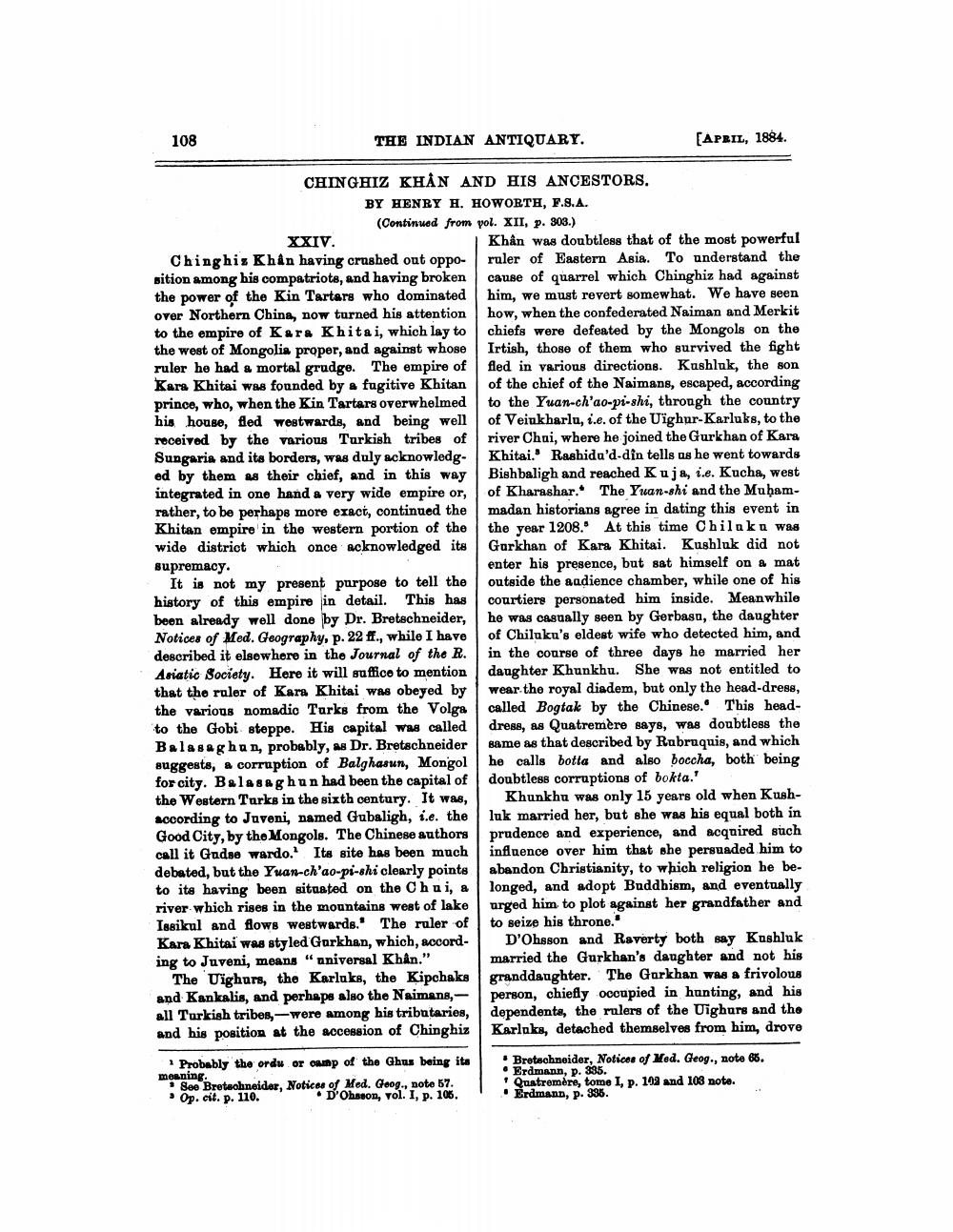________________
108
THE INDIAN ANTIQUARY.
[APRIL, 1884.
CHINGHIZ KHÅN AND HIS ANCESTORS.
BY HENRY H. HOWORTH, F.S.A.
(Continued from pol. XII, p. 303.) XXIV.
Khân was doubtless that of the most powerful Chinghis Khan having crushed out oppo- ruler of Eastern Asia. To understand the sition among his compatriots, and having broken cause of quarrel which Chinghiz had against the power of the Kin Tarters who dominated him, we must revert somewhat. We have seen over Northern China, now turned his attention how, when the confederated Naiman and Merkit to the empire of Kara Khitai, which lay to chiefs were defeated by the Mongols on the the west of Mongolia proper, and against whose Irtish, those of them who survived the fight ruler he had a mortal grudge. The empire of fled in various directions. Kushluk, the son Kara Khitai was founded by a fugitive Khitan of the chief of the Naimans, escaped, according prince, who, when the Kin Tartars overwhelmed to the Yuan-ch'ao-pi-shi, throngh the country his house, fled westwards, and being well of Veinkharlu, i.e. of the Uighur-Karluks, to the received by the various Turkish tribes of river Chui, where he joined the Gurkhan of Kara Sungaria and its borders, was duly acknowledge Khitai.' Rashida'd-dîn tells us he went towards ed by them as their chief, and in this way Bishbaligh and reached Kuja, i.e. Kucha, west integrated in one hand a very wide empire or, of Kharashar.. The Yuan-shi and the Muhamrather, to be perhaps more exact, continued the madan historians agree in dating this event in Khitan empire in the western portion of the the year 1208. At this time Chilaku was wide district which once acknowledged its Gorkhan of Kara Khitai. Kushluk did not supremacy.
enter his presence, but sat himself on & mat It is not my present purpose to tell the outside the audience chamber, while one of his history of this empire in detail. This has courtiere personated him inside. Meanwhile boon already well done by Dr. Bretschneider, he was casually seen by Gerbası, the daughter Notices of Med. Geography, p. 22 ff., while I have of Chiluku's eldest wife who detected him, and described it elsewhere in the Journal of the R. in the course of three days he married her Asiatic Society. Here it will suffice to mention daughter Khunkhu. She was not entitled to that the ruler of Kara Khitai was obeyed by wear the royal diadem, but only the head-dress, the various nomadic Turks from the Volga called Bogtak by the Chinese. This headto the Gobi steppe. His capital was called dress, as Quatremère says, was doubtless the Balasaghan, probably, as Dr. Bretschneider same as that described by Rubruquis, and which suggests, a corruption of Balghasun, Mongol he calls botta and also boccha, both being for city. Balasag hun had been the capital of doubtless corruptions of bokta." the Western Turks in the sixth century. It was, Khunkhu was only 15 years old when Kushaccording to Juveni, named Gubaligh, i.e. theluk married her, but she was his equal both in Good City, by the Mongols. The Chinese authors prudence and experience, and acquired such call it Gudso wardo.' Its site has been much influence over him that she persuaded him to debated, but the Yuan-ch'ao-pi-shi olearly points abandon Christianity, to which religion be beto its having been situated on the Chui, a longed, and adopt Buddhism, and eventually river which rises in the mountains west of lake urged him to plot against her grandfather and Issikul and flows westwards. The ruler of to seize his throne." Kara Khitai was styled Garkhan, which, accord- D'Ohsson and Raverty both say Kushluk ing to Juveni, means "universal Khan." married the Gurkhan's daughter and not his
The Uighurs, the Karloks, the Kipchaks granddaughter. The Gorkhan was a frivolous and Kankalis, and perhaps also the Naimang, person, chiefly occupied in hunting, and his all Turkish tribes, -were among his tributaries, dependenta, the rulers of the Uighurs and the and his position at the accession of Chinghiz Karlaks, detached themselves from him, drove
Probably the ordu or camp of the Ghus being ita mesning.
Soo Bretschneider, Notices of Med. Geog., noto 57. • Op. cit. p. 110.
D'Ohsson, vol. I, p. 106.
Brotechneider, Notices of Mod. Geog., note 68. • Erdmann, p. 335.
Quatremère, tome I, p. 192 and 103 note. Erdmann, p. 395.




